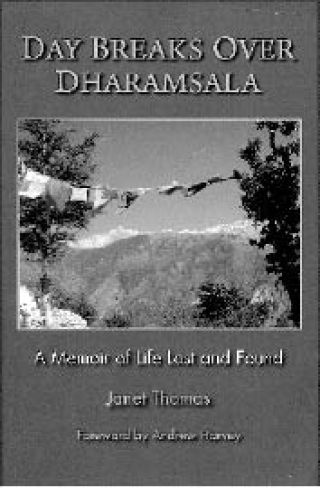How does one recover from a childhood of ritual abuse, child pornography, electrical shocks and Satanic parents? How does the same person become a well known playwright, author, and magazine editor? Janet Thomas has the answers.
In her memoir, “Day Breaks Over Dharamsala,” we read her eloquent story of recovery and how she finds “grace” in spite of tremendous personal challenges. She tells us simply that “grace happens whether we recognize it or not.”
Thomas, a skilled and an impressive writer, weaves her story of “life lost and found” through insightful, clear passages as she and her friend, Thrinley, travel to India where they are enveloped by warm, joyful Tibetans in the city of Dharamsala.
Located at the edge of the Dhauladhar Mountains, Dharamsala is the city where His Holiness the Dalai Lama and his people—those who have escaped from Tibet—live in exile.
It is here that Thomas finds grace, once again, and a sense of home. Although her long, winding path of recovery has taken over 40 years, she continues her spiritual journey undaunted. As each layer of her childhood is remembered and then, slowly healed, her story becomes more remarkable.
Earlier in her recovery, Thomas goes to a conference about ritual abuse. There she learns about the wide scope of mind control and how survivors of ritual abuse commonly use dissociation techniques to block the memory of their experiences. She relates to dissociation (the latest term for MPD or multiple personality disorder) with matter of fact poignancy.
Her “people” are real, independent voices who took control of her life out of the need for sheer survival.
It is baffling to discover that there are thousands of ritual abuse survivors in this country and, frequently, the perpetrators are parents or close relatives. Yet, this happens every day.
It is to Thomas’ credit that she has “spilled the beans” and helped open the door with such articulate style. The reader is swept along the memoir with a feeling of grace as Thomas spins her present day tale in India with fragments of the past.
We are charmed by Thomas’ wit and fluent sensitivity. She draws on her Buddhist practice with simple statements that carry profound meaning for her—and, hopefully, the reader. Though we might not be able to relate to Thomas’ pain and anguish, we can, with all certainty, relate to her revelations and the truth she speaks. For truth is true. And, Thomas speaks her truth.
As a child, Thomas wasn’t allowed to speak but she learned to read. She wasn’t allowed college but she learned to write. In Dharmasala, she teaches English to a young Buddhist monk. He is very exacting about how he wants to learn. She, in turn, wants to teach him simple, easy English sentences for him to use while traveling.
Through grace, they combine efforts and the outcome is gratifying for both. For Thomas, it’s the simple things that carry deep meaning.
To simply “be” is a precious gift for her. It is through the development of spiritual skills as a result of her childhood traumas that enables Thomas the innate ability to reach out and actually “be.”
It took many years and a trip to India to realize this and then take back her Self. It is through grace that this happens.




